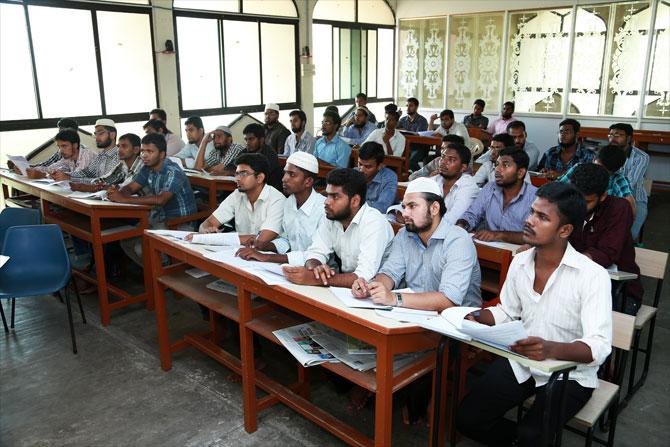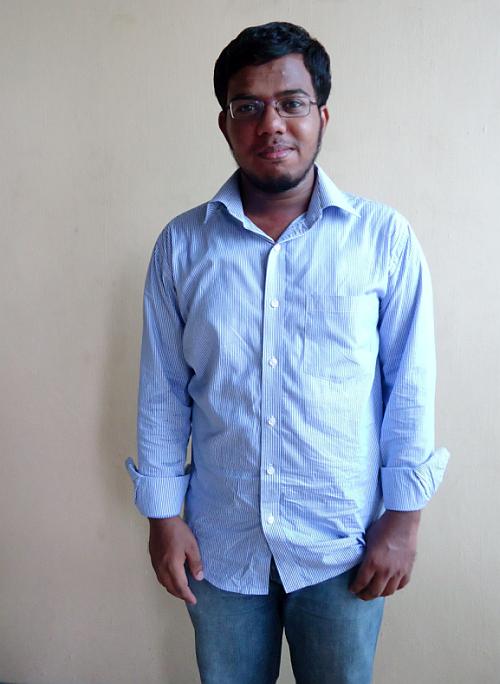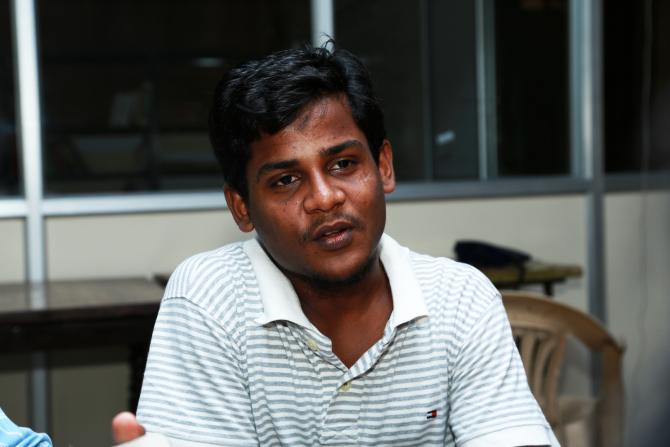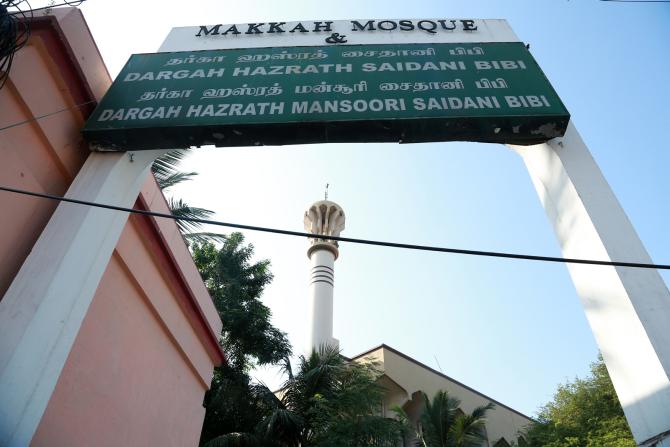 | « Back to article | Print this article |
Why this maulana runs an IAS academy from a Chennai mosque
Maulana Shamsudeen Qasimi, who runs Azhagiya Kadan IAS Academy from Makkah Masjid, Chennai, believes the Indian civil service forms the backbone of the government and can help the Muslim community earn its rightful place.
Ours is one of the most discriminated and least understood communities in the world today.
"The utter contempt and hatred for the Muslim population cannot be justified by the acts of terrorism by a few in our community. It is downright humiliating and degrading. The saddest and scariest part of this situation is that we have nobody to defend or speak for us.
"Today, to be heard, we require a certain degree of power. Of course getting into politics would be one way of safeguarding our interest. But politics too has its drawbacks; there is always pressure from the top brass and besides there is no stability in politics.
So our only option became the Indian civil service, the backbone of the Indian government."
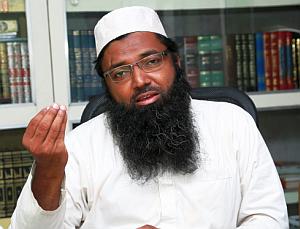 That was Maulana Shamsudeen Qasimi, chief imam of the Makkah Masjid in Anna Salai, Chennai. He doesn't pull his punches while speaking about the discrimination against his community.
That was Maulana Shamsudeen Qasimi, chief imam of the Makkah Masjid in Anna Salai, Chennai. He doesn't pull his punches while speaking about the discrimination against his community.
But he has set out to do something constructive about it.
He founded the Azhagiya Kadan IAS Academy. It started February last year on the mosque's premises.
The academy trains Muslim students for the competitive civil service examinations. It does so free of cost, providing accommodation and food as well.
The maulana sees the civil service in India as a powerful and prestigious organ of the government. Unfortunately, he says, in the past 18 years, no Muslim candidate from Tamil Nadu has cleared the IAS exam.
"We started the academy with the aim of reversing these statistics. Today I am proud to say that of our initial batch of 30 students, three have successfully cleared the UPSC (Union Public Service Commission) preliminary exam. Three others have cleared TNPSC (Tamil Nadu Public Service Commission) Group 1 exam. Five of our academy students have also cleared the staff selection commission preliminary exam."
'It will be an honour to work for our country, while at the same time being in a position to help my community as well'
Mohammed Meera Sahib, an engineering graduate, is a beneficiary of the academy. He has cleared the preliminaries of both the UPSC and the TNPSC Group 1 exam. He is now preparing for the main exam to be held later this year.
"I belong to a typical, middle-class Muslim family. After completing my engineering, I was in a dilemma whether to take up a job or continue with my master’s degree when I heard of the Azhagiya Kadan IAS Academy. The idea immediately appealed to me and I decided to apply," says Mohammed.
It's a very hectic schedule, but he enjoys the work. "This is truly great opportunity for me; it will be an honour to work for our country, while at the same time be in a position to help my community as well."
He is a strong believer in the transformative power of education. "Our community does not readily accept change and this could be one of reasons for our backwardness. Many believe that Western education is against Islam and its people. We need to make them understand the importance of education for the youth of today," says Mohammed.
Maulana Shamsudeen agrees. "Most of the youth from our community work abroad. They spend their entire life in low-paid, low-skilled menial jobs under difficult and harsh conditions.
"If they are only made aware of the opportunities available in our country and the immense scope that only education can provide, then ours will be a much-better represented community in society."
Motivational camps conducted by the academy this year, in colleges in several districts in Tamil Nadu, have reached more young people, says A Arif, the academy’s administrative officer.
He says that this year the academy is supporting 50 students. "Last year, we received about 800 registrations and exams were conducted in five centres across the state. This year, with over 1200 applicants, we added two more centres." After the written exam, the short-listed candidates were asked to come for a personal interview based on which the final selection of 50 candidates was made.
'I am so much closer to fulfilling my dreams. It feels great'
Plans are afoot to expand the awareness to schools so children are aware of this career option early. The programme will also be extended to women of the community next year.
Arif says the funding comes from the Azhagiya Kadan Arakkattalai, a charitable trust set up by Maulana Shamsudeen to provide educational aid to poor Muslim students since 2001.
"All the expenses are met with donations sent by generous patrons from across the world to help the community. Some of them even (offer) sponsorship for an entire month, which works out to about Rs 2.5 to Rs 3 lakhs," says Arif.
Maulana Shamsudeen says that the academy is the first of its kind in the country. Extensive research was done before setting it up. There were brainstorming sessions with IAS officers and a field trip to Delhi, which is the hub of civil services coaching institutes.
The faculty and course material comes from several reputed coaching institutes, "but for the Mains (main exam), we have a tie up with the Shankar IAS Academy, one of the leading institutes in Chennai today," the maulana says.
H Akbar Ali, from Udankudi, Thoothukudi (formerly Tuticorin) district, is the first to attend college in his family. He has cleared the TNPSC Group 1 exam.
"My father is a cook. I have two elder brothers who help my uncle with his business. I have always wanted to be a collector. But there was no one to guide me. I did not even know about the UPSC and TNPSC exams.
"I joined the academy August last year, and cleared the prelims (preliminary exams), which were held in May. Now, just a year later, I am so much closer to fulfilling my dreams. It feels great," he says.
'Just work for the betterment of the country'
Maulana Shamsudeen believes that only honest and god-fearing IAS officers can put an end to corruption in India.
"At the academy, along with the regular training, we also inculcate Islamic principles and values, so that in future our students are free from the evils of corruption and bribery and do not misuse their power or authority in the course of their work.
"We don't expect them to do anything in return for the academy. Just work for the betterment of the country, while simultaneously helping and supporting the Muslim community."
The idea of the training academy has caught on slowly. "Today we are being approached by Muslim communities across India to start a similar academy in their state," says Maulana.
For now, though, he is concentrating on making this first centre a success.
